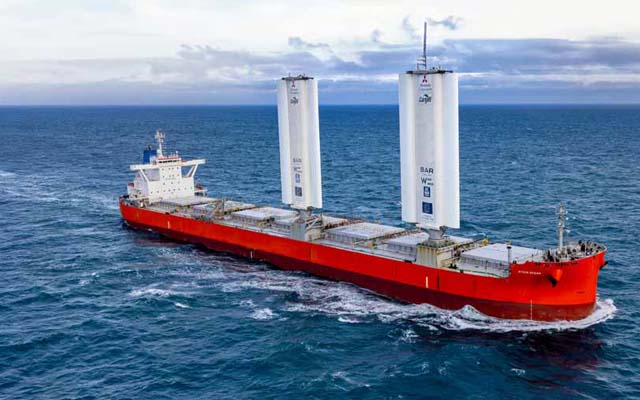Cargill says that the company is advancing a new era in sustainable shipping, putting innovation and collaboration at the core of its mission to move goods responsibly across the globe.
Through wind-assisted propulsion technologies, dual-fuel methanol-powered vessels, and digital solutions, Cargill is setting the standard for helping the industry advance progress toward the IMO 2050 net-zero target. Combining technical expertise with a commitment to industry-wide partnerships, Cargill is helping to future-proof the maritime sector while enabling customers to meet their sustainability goals.
Jan Dieleman, president, Cargill Ocean Transportation said: “Decarbonising shipping is a monumental task that requires courage, innovation, and collaboration,” said . “Our role extends beyond freight-shipping services; we aim to catalyse a shift across the industry toward sustainable practices. Through strategic investments in cutting-edge technology and robust partnerships, we are accelerating the journey to net-zero emissions in shipping.”
Leading the charge in wind-assisted propulsion, the Pyxis Ocean—the first dry bulk vessel equipped with BAR Technologies’ WindWings—completed its maiden voyage in 2023. WindWings are large, rigid sails that harness wind power to reduce fuel use and emissions. In addition to WindWings, Cargill has expanded its wind-assisted technology program to include VentoFoil vertical suction sails on the NBA Magritte and rotor sails on the TR Lady. With these three vessels the company is experimenting and learning before scaling up technical, operational and commercial aspects. These technologies further utilise wind power to decrease fuel dependency and emissions, aligning with the IMO’s target to have 5-10% of maritime energy from renewable sources by 2030.
Cargill believes that wind could make an important contribution to achieving decarbonisation goals in the short, medium, and long term. Dieleman says that while the cost of fuels that could contribute to a zero-carbon future may remain high, developing, testing, and improving wind assisted propulsion technologies before these fuels are available could reduce reliance on them.
Alongside wind propulsion, Cargill is transforming fuel usage across its fleet. The company is pioneering biofuels made from renewable sources, such as fatty acid methyl esters (FAME), providing a drop-in fuel option to lower emissions without extensive engine modifications. In 2023, the company moved from trialling these fuels to frequent execution as it prepares to scale up. Nearly 172,000t of biofuel blends containing 63,000t of FAME was lifted in 2023. Cargill says it is the first dry-bulk charterer to sign commercial agreements for dual-fuel methanol-powered ships, which are expected to be operational within the next two years. Methanol, a low-carbon alternative fuel, offers a scalable pathway to zero emissions. These methanol-powered vessels—the first of their kind in commercial service—highlight Cargill’s proactive approach in adopting sustainable fuel solutions to support both its own and its customers’ ambitious Scope 3 emissions reduction goals.
Digital innovation is also central to Cargill ’s decarbonisation efforts. Cargill is using advanced digital tools, including voyage optimisation technologies, to create digital twins of its vessels. This enables optimal speed and route planning to reduce fuel consumption and emissions. Partnering with ZeroNorth, Cargill leverages these digital solutions to enhance operational efficiency and sustainability, reinforcing its commitment to data-driven progress toward net-zero.
Recognising that decarbonising the maritime industry requires a collaborative approach, Cargill partners across the sector to drive meaningful progress. As a founding member of the Maersk Mc-Kinney Moller Center for Zero Carbon Shipping, Cargill works with industry leaders to test and promote alternative fuels, including ammonia and methanol. Cargill is a key player in the Sea Cargo Charter, a coalition dedicated to reducing shipping’s climate impact through transparency and shared decarbonization frameworks.
Dieleman added: “As we continue this journey, we’re focused on solutions that don’t just improve our own operations but drive change across the industry. Our vision is a shipping sector that delivers the goods the world needs while protecting our planet’s future. We’re proud to be part of this transformation and are committed to building a more sustainable future for global shipping.”
Image: BAR WindWings is one of the wind assistance technologies being trialled by Cargill (source: Cargill Ocean Transportation)



